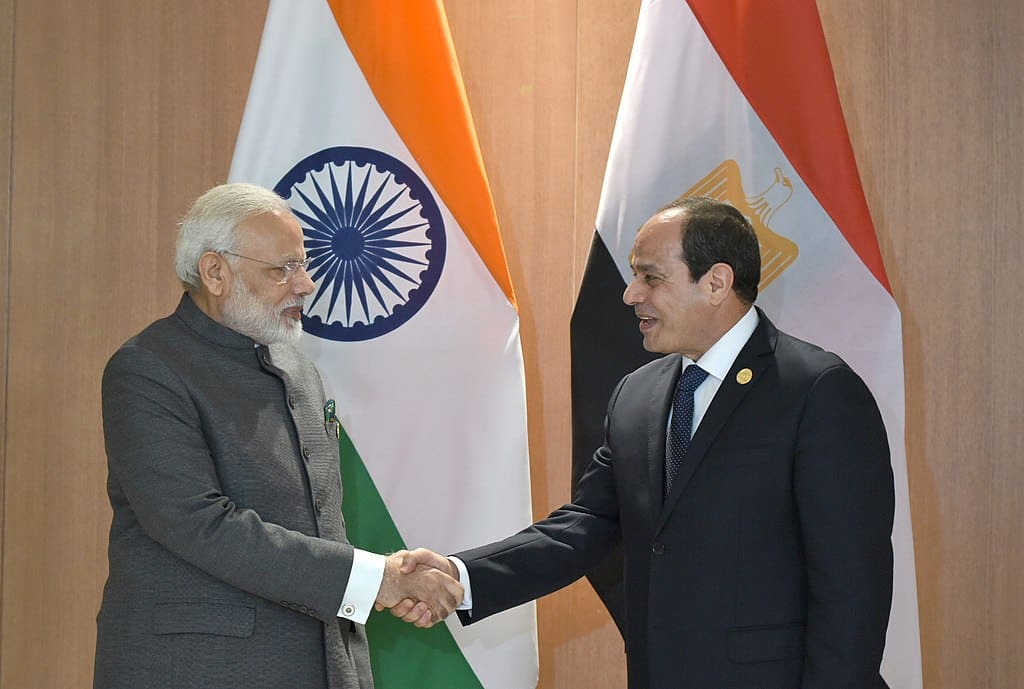For the first time since 1997, an Indian Prime Minister has embarked on an official visit to Egypt. This past Sunday, the incumbent Prime Minister Narendra Modi met with Egyptian President Abdel Fattah El Sisi in Cairo, indicating a promising new phase for relations between the two influential powers. The meeting took place at the presidential residence in the suburban area of Ittihadiya.
Arriving in Egypt on Saturday, Modi was received by Egyptian Prime Minister Mostafa Madbouly. Later, both leaders attended discussions alongside senior government representatives from both nations. This journey marks Modi’s inaugural visit to Egypt, though El Sisi himself has already visited India thrice since both leaders assumed office in 2014, with his most recent trip taking place in January.
In addition to these bilateral talks, Modi conversed on Saturday about “challenging extremism and radicalisation” with Egypt’s chief Islamic scholar, Grand Mufti Shawki Allam, as reported by Arindam Bagchi, a spokesperson for the Indian External Affairs Ministry. Modi’s arrival in Egypt followed his visit to the United States, where he met President Joe Biden and addressed the US Congress.
Modi’s itinerary includes a visit to the historic mosque Al-Hakim in Cairo’s old town, recently restored with aid from the Dawoodi Bohra community based in India. He will also pay respects at the Heliopolis War Cemetery, a memorial to Indian soldiers who served in the British Indian Army during the First World War.
India’s notable emergence as an economic and military powerhouse is underscored by Modi’s significant trips to both Washington and Egypt. Its new status as the world’s most populous country, having surpassed China, only amplifies India’s standing on the global stage.
Despite being the Arab world’s most populous nation with 105 million inhabitants, Egypt confronts substantial economic challenges, having been forced to devalue its currency thrice since last year due to inflation nearing record highs and a dollar shortage impacting import-dependent industries.
Nevertheless, Egypt is currently undertaking a comprehensive, multibillion-pound regeneration of its infrastructure, which includes the construction of two dozen new cities, an expansive network of roads, a nuclear power station, and monorail and high-speed rail connections, all worth billions of pounds.
Egypt’s strategic role in the defence of vital Red Sea shipping lanes, its position as one of the world’s largest arms purchasers, and its historical mediator role in the Israeli-Palestinian conflict, underscore its international and regional relevance.
When they last convened in India in January, Modi and El Sisi committed to a series of initiatives intended to boost bilateral trade to $12 billion within five years, an increase from the $7.3 billion recorded in 2021-22. The nations also endorsed agreements for heightened collaboration in the areas of cyber security, information technology, culture, and broadcasting.
Indian companies have made significant investments in various sectors of the Egyptian economy, including chemicals, energy, textiles, clothing, agribusiness, and retail. Over 50 Indian firms have collectively invested about $3.15 billion.
The two nations have also conducted a series of joint military exercises, exchanged vital intelligence, and coordinated counterterrorism initiatives. A potential collaboration to produce military equipment in Egypt, targeting primarily African markets, is currently under consideration.
Egypt has shown keen interest in Indian defence products and is ready to collaborate, according to Ani Trigunayat, a retired Indian diplomat with extensive Middle Eastern experience. Signalling India’s burgeoning relations with Egypt, it invited the Arab nation, alongside Oman and the UAE, to attend the G20 Summit in September as special guests.
Image Credit: India Prime Minister’s Office



















